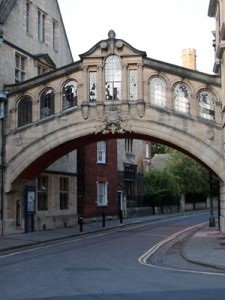Nick Haddad currently serves as the C.S. Lewis Foundation’s Assistant to the Warden for The C.S. Lewis Study Centre at The Kilns. Before moving to Oxford, Nick served the Foundation as an intern in our Redlands office, as well as received his B.A. at Belmont University in Mass Communications. As a part of his time spent at The Kilns, Nick has agreed to write a series of blog posts regarding his experiences in order to give our readers an idea of what it is like to work and live in the former home of C.S. Lewis.
 A large part of my job is to lead tours for visitors and people who are passionate about Lewis. I do love giving tours because you get a chance to interact with people from all over the world who, through one avenue or another, have been influenced by Lewis. From the young kids who just read The Chronicles of Narnia for the first time, to the scholars who have invested all their study on the works of Lewis, they all make their way to the Kilns throughout the week.
A large part of my job is to lead tours for visitors and people who are passionate about Lewis. I do love giving tours because you get a chance to interact with people from all over the world who, through one avenue or another, have been influenced by Lewis. From the young kids who just read The Chronicles of Narnia for the first time, to the scholars who have invested all their study on the works of Lewis, they all make their way to the Kilns throughout the week.
As a tour guide, I have to know the history of the home, as well as have a firm knowledge of the life of Lewis to answer any questions thrown my way. When I conduct a tour, questions do arise about the life of Lewis, the history of the home, and general inquiries as to the happenings of the house. So with that, I’d like to present my answers to “Seven Frequently Asked Questions I Get While Giving a Tour.” These aren’t really in any particular order.
Number 7: How accurate is the film Shadowlands?
Shadowlands, for those of you who haven’t seen it, is a film about the relationship between C.S. Lewis and his American wife Joy. The film chronicles their friendship, first “green card marriage,” Joy’s struggles with cancer, their marriage before God, and Joy’s eventual passing. It is a really beautiful film, and as a grown man, I openly admit to crying every time I see it. The film is a great representation of the relationship between Jack and Joy. Deborah Winger, the actress who played Joy, did an amazing job portraying her from what I’ve been told by Douglas Gresham, Joy’s son, and from other sources. She really captured the character, the life, and the spirit of Joy, and she even looks like her. Anthony Hopkins played C.S. Lewis, and I’ve been told multiple times that he did an amazing job playing…Anthony Hopkins. Unfortunately, Hopkins failed to capture the style and personification of C.S. Lewis. Plus, Lewis never drove, but beyond that the film is quite accurate and a treat to watch.
Number 6: Why did Maureen get rid of all of Lewis’ books and the furniture in the Kilns?
After Warnie passed away in 1973, Maureen, Mrs. Moore’s daughter, put the home up for sale and had the furniture sold at an auction house. The best reasoning behind this was that Maureen had little to no idea of the impact that C.S. Lewis would have on the world, and she figured his stuff was, just that, stuff. Lewis was not very materialistic and to him, it was just furniture, and it was just books, and Maureen probably understood this about Lewis.
Question 5: What happened with all of the items in the home after it was sold?
There are a few surviving pieces that we know about, mostly because of Walter Hooper. Walter owns one of the desks that Lewis had in the Kilns. The Wade Center at Wheaton College owns the most Lewis memorabilia, including some manuscripts, Warnie’s diary, and one of the wardrobes that was in the home. Westmont College in Santa Barbara, California also owns an original wardrobe, which has lead to both colleges having “Wardrobe Wars” over who owns the wardrobe that inspired The Chronicles of Narnia. But beyond that, we unfortunately do not know what happened to a lot of the items from the Kilns.
Question 4: Did Lewis use the current toilet in the Kilns?
You’d be surprised how often I get this question. It’s usually a joke, but I play along with it anyway. But the actual answer is yes and no. He used the toilets in the home (the two original ones), but the original toilet seats have been replaced.
Question 3: How did Lewis get all the way to Oxford City Centre?
As stated in Question 7, Lewis did not drive: He attempted once when he was young and was so bad at it that his family forbid him from ever trying again. So when he wanted to get into Oxford he would often times walk from the Kilns to the city centre. If walking was not an option, he would either take the bus, have Fred Paxford drive him, or, most frequently, join Warnie in the side car of his motorcycle.
Question 2: What happened to Lewis’ stepsons David and Douglas?
We actually do not know a lot of what happened to David Gresham. Last we heard, David resides in Switzerland and has no association with the legacy of Lewis. Douglas Gresham can tell you much more about his life in his book Lenten Lands, but in a short explanation, Douglas actually spent many years in Tasmania becoming a renowned DJ (a feature you’ll find obvious if you hear his booming and commanding voice). He also has an amazing family and has made his own name for himself instead of leaning on his stepfather’s renown. Douglas is currently head of the Lewis estate, appearing at conferences and involved with the film adaptations of The Chronicles of Narnia.
Question 1: What are your thoughts on Lewis and Mrs. Moore?
This is actually the most frequent question asked whenever I give a tour. There is a lot of gray area in the relationship between Lewis and Mrs. Moore. Some biographies lean hard on this grayness, others prod less into this area of Lewis’ life. From my readings on Lewis, as well as from conversations with scholars of Lewis, if there was ever anything romantic in Lewis’ and Mrs. Moore’s relationship, it ended before moving to the Kilns. And in complete honesty, if there was some sort of affair, I do not think it matters. Lewis was a human; he had flaws. But upon becoming a Christian, he eventually set right his relationship with Mrs. Moore.
All of these answers are completely my own opinion and do not reflect the C.S. Lewis Foundation’s views on the life of Lewis and the Kilns. But hopefully this answers some of the questions my readers may have had about Lewis and the Kilns. Until next time, this is Nick Haddad, signing off.
Nick, thanks for your blogs! Any thoughts re the BBC version of Shadowlands? I thought Joss Ackland did a much better version of Lewis.
Hello Mike,
Thank you for commenting! I have heard from other sources that Joss Ackland did a better job portraying C.S. Lewis than Anthony Hopkins; however, I do not know Douglas Gresham’s thoughts on the BBC version.